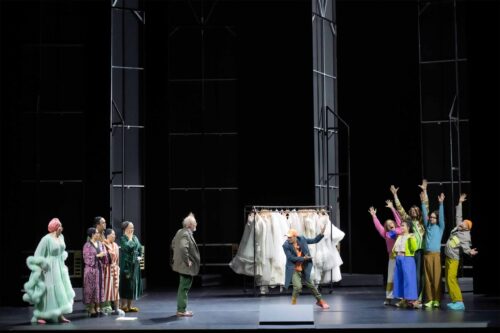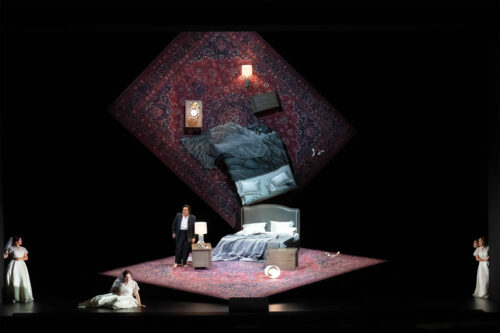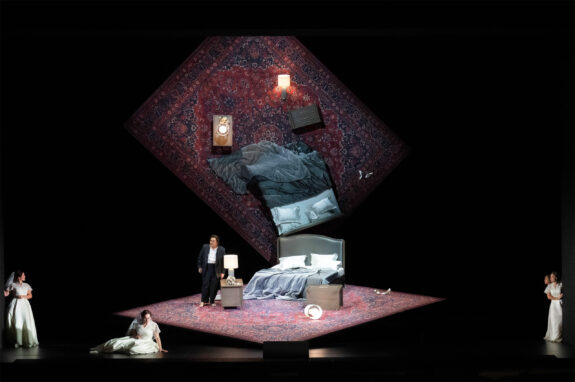 Switzerland R. Strauss, Ariadne Auf Naxos: Soloists, Philharmonia Zurich / Markus Poschner (conductor). Zurich Opera, 25.9.2024. (MF)
Switzerland R. Strauss, Ariadne Auf Naxos: Soloists, Philharmonia Zurich / Markus Poschner (conductor). Zurich Opera, 25.9.2024. (MF)

Opening his last of 13 seasons as Zurich Opera’s General Director, Andreas Homoki directs Ariadne auf Naxos, the second work of Richard Strauss and his librettist Hugo von Hofmannsthal. Superimposing several levels, they explore the meaning of love (are we free in our choices?) and art (who does art belong to?) and affectionately deride the occasional ridicule of the theatrical world.
The plot introduces the invisible and anonymous ‘richest man of Vienna’ who commissioned the tragic opera Ariadne auf Naxos and a dance comedy for the same evening. Initially intended to be played one after the other, the patron requests on a whim that both plays, the sad and the light one, be staged simultaneously. The opera’s young composer is in great despair. What is more, the entire performance is to last no more than one hour because fireworks are scheduled for the guests thereafter. The decision stands: cash is king. The composer and his music teacher, in dire need of the agreed remuneration, are forced to comply. The spheres of the tragic and the comic intertwine. The world of Ariadne, grief stricken in her cave and miserably deserted by Theseus, on the one hand, and on the other, the world of light-hearted Zerbinetta with her rowdy commedia dell’arte troupe.
The opera’s first premiered in 1912 and lasted for close to six hours, including dinner that is. For its second premiere in 1916, the version we know today was substantially reworked and shortened to the now customary two hours. And a jolly and entertaining couple of hours they are.
Befitting ‘opera in an opera’ character of Ariadne, the audience enters the house to an open and entirely empty stage. With the overture approaching, more and more actors and dancers appear for a collective warm-up. As the Vorspiel – the evening’s first part – progresses, the stage gets increasingly populated with workers lowering a costume rail from the ceiling with plenty of phenomenally colourful frocks that wildly contrast with the pitch-black background. Stage props are rolled in and turned towards the back. We are watching the preparations from behind the scenes.
The second part, the actual Oper, takes place in part against the closed curtain, especially Zerbinetta’s pièce de resistance aria ‘Grossmächtige Prinzessin’. Chinese soprano Ziyi Dai performs with delightful lightness and joy, displaying the full range of her comedic charm. Having been a member of the Zurich International Opera Studio until just over a year ago, she is quite simply a phenomenal Zerbinetta. She assuredly straddles the two apparent extremes of grappling with introspective self-questioning and bursting into exuberant coloratura brilliance, including some daring variété moves. Dai is the evening’s star.

Ariadne’s cave, then, is the empty dark stage space. From it emerges the wüste Insel, the ‘desert island’. It is a flying carpet carrying the unmade nuptial bed – a nod to Tracey Emin perhaps? – in which several brides awake one after the other; they are Ariadne and the three nymphs. We are left to think that the bedroom is where Ariadne had been deserted (pun intended) by Theseus. Ariadne meets Bacchus who joins her coming from an identical bedroom, vertically tilted at a 90° angle against that of Ariadne. A spectacular image.
Over the course of the evening, the production strikes an apt balance between the light-hearted and the serious, possibly much as the unknown richest man of Vienna had intended. Whereas Zerbinetta and her comedic troupe are dressed in Hannah Clark’s brightly coloured contemporary costumes lowered onto the stage earlier, the rest of the cast are clad in darker and more covert tones, the composer (Lauren Fagan) and the music teacher (Martin Gantner) in elegant English country style green.
Homoki puts a particular focus on the composer’s role. According to the libretto, his last despairing words (‘Lass mich erfrieren, verhungern, versteinen der meinigen [Welt]’) conclude the Vorspiel. But in this production, following his near breakdown, he keeps a close watch over the second half (Oper) with occasional silent appearances. At the end of the Oper, when all the others have left and the last note hushes, the composer remains alone on the empty stage, appearing somewhat disoriented. Zerbinetta steps in, seizes him by the hand and gently as much as playfully leads him out, the two disappearing back into the wings. A touching end to a truly enjoyable evening.
The music by Strauss refers back to one of his personal musical monuments, Richard Wagner, whose Ring des Nibelungen Homoki staged in Zurich over the past three seasons. It is thus only fitting that Homoki cast several of his Ring singers in this Ariadne, Wagner and Strauss specialist Daniela Köhler (Sieglinde in Zurich’s Walküre) as Prima donna/Ariadne, Lauren Fagan (Gutrune in Götterdämmerung) as composer and Rebeca Olvera (an unforgettable Woodbird in Siegfried) as Echo. Köhler and Fagan combine the Wagner/Strauss power with gentle, almost Lied-like nuanced singing. Fagan gives a multi-faceted, at times slightly nerdy and even hypochondriac composer. Köhler harmonises well with John Mathhew Myers’s Bacchus. The major domo, the Haushofmeister, which Alexander Pereira, a predecessor of Homoki as General Director had famously taken on in more than one Zurich production, is embodied by the magnificently ironic Kurt Rydl. With his generous bass, Rydl thoroughly enjoys his text’s Viennese linguistic finesses. Both the comedic troupe (Yannick Debus as Harlekin, Daniel Norman as Scaramuccio, Hubert Kowalczyk as Truffaldin and Andrew Owens as Brighella) and the nymphs (Yewon Han as Nayade, Siena Licht Miller as Dyade and Rebecca Olvera as Echo) lend appropriate support, bringing a broad range of colours and emotions to the stage.
Markus Poschner and the Philharmonia Zurich, performing in a 37-strong chamber orchestra setting, provide the musical ground, harmonising beautifully with the singer ensemble, coherently and precisely modulating the varying atmosphere and differing moods.
Michael Fischer
Production:
Director – Andreas Homoki
Set – Michael Levine
Costumes – Hannah Clark
Lighting – Franck Evin
Dramaturgy – Kathrin Brunner
Cast:
The Prima donna / Ariadne – Daniela Köhler
The Tenor / Bacchus – John Matthew Myers
A music master – Martin Gantner
Zerbinetta – Ziyi Dai
Composer – Lauren Fagan
Major-Domo – Kurt Rydl
An officer– Tomislav Jukic
The dancing master – Nathan Haller
A wigmaker – Yannick Debus
A lackey – Maximilian Bell
Harlekin – Yannick Debus
Scaramuccio – Daniel Norman
Truffaldin – Hubert Kowalczyk
Brighella – Andrew Owens
Naiad – Yewon Han
Dryad – Siena Licht Miller
Echo – Rebeca Olvera
Extras Association of Zurich Opera
